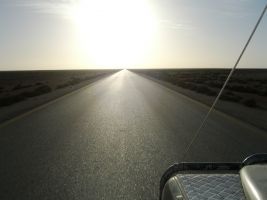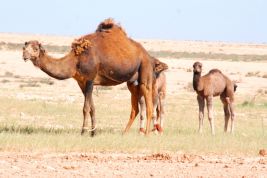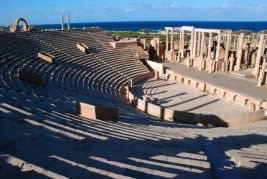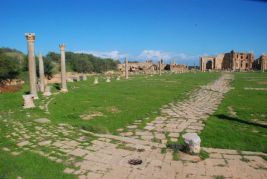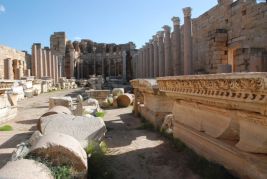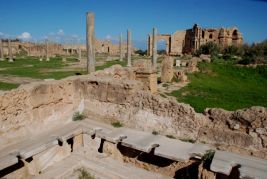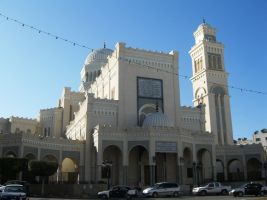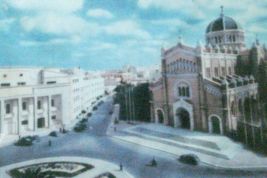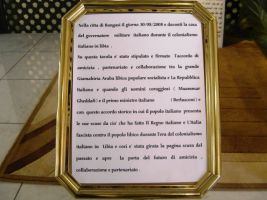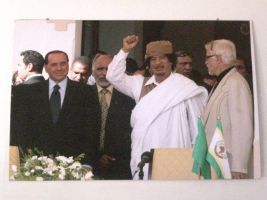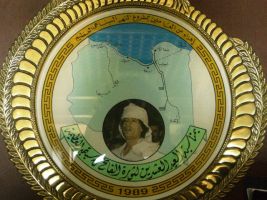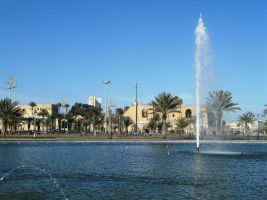
 Italia
Italia France
France Spain
Spain Morocco
Morocco Mauritania
Mauritania Senegal
Senegal Mali
Mali Burkina
Burkina Ghana
Ghana Togo
Togo Benin
Benin Nigeria
Nigeria Cameroon
Cameroon Gabon
Gabon Sao Tomè
Sao Tomè Gabon 2
Gabon 2 Congo
Congo Congo DCR
Congo DCR Angola
Angola Namibia
Namibia Sud Africa
Sud Africa Namibia 2
Namibia 2 Botswana
Botswana Zimbabwe
Zimbabwe Botswana 2
Botswana 2 Sud africa 2
Sud africa 2 Swaziland
Swaziland Mozambico
Mozambico Malawi
Malawi Tanzania
Tanzania Rwanda
Rwanda Uganda
Uganda Kenya
Kenya Etiopia
Etiopia Sudan
Sudan Egitto
Egitto Libia
Libia Tunisia
Tunisia Malta
Malta
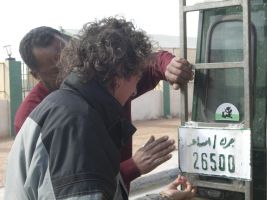
Entrance – 26 Jan 2009
We wake at dawn and by 7:30 we’re in front of the Libyan border.
Across the border, we expect, apart from the gendarmeries, that our guide (obligatory) will be waiting for us along with documents and number plate.
Wrong.
The police kindly ask us to wait a side. It is incredibly cold. After a few calls using our satellite phone, all we’re able to reveal, is that there still isn’t anyone waiting for us on the other side.
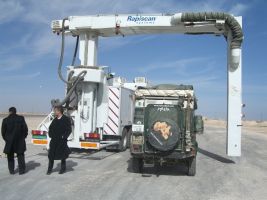
Our guide, Mahmud will be four hours late; arriving at eleven.
Not the best start.
We are quite annoyed, but he seems to be a good guy. He is accompanied by Abdullà, who he says is his driver for the journey.
We attach the number plates and fortunately everything at customs is over with quickly. We don’t really know if the procedures are easy or if the driver just made them so. In time we find that the second hypothesis is correct. However, the customs workers are cordial; some even speak Italian.
As we exit they X-ray our K7 with this large truck scanner…
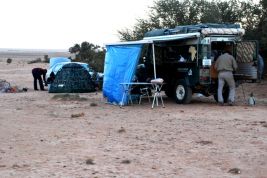
Camp
We gather some supplies and then leave. Two vehicles, K7 and our guide’s saloon car. At sunset, we turn off the road and find a nice spot in the desert. There is a strong cold wind; the sun that during the day is warm enough to allow shirt sleeves has gone, so we light a fire. Mahmud invites us to eat a barbeque with him. He comes from the Akakus desert and there, they barbecue all the time.
Macaroni, tomatoes, spices and chicken. Delicious!
Kilometre after Kilometre
Twelve-hundred kilometres of nothing. Straight road. Desert both sides of us. Three-days of deadly boredom!
Leptis Magna – 28 Jan 2009
Grand, majestic, imposing.
Despite the fact that it is dilapidated, its shear size, design and construction along with a plethora of sculptures, you imagine a once very important imperial city.
It was founded by the Phoenicians, inhabited by the Carthaginians until the arrival of the Romans.
The emperor Septimius Severus, originally a Libyan born in 203 B.C. brought it to its maximum glory.
Here is the open amphitheatre by the sea.
This is the basilica and the latrines along with the remains of villas. There are also thermal baths, swimming pools, a big square with a palace and the forum. Truly amazing.
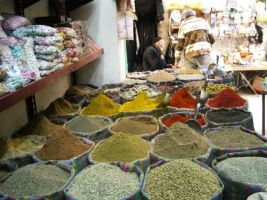
Tripoli – 29 Jan 2009
We enter the capital of Libya. We buy some postcards and post them.
The penultimate country.
We roam around the calm but crowded medina.
No one asks us anything.
It’s like a dream, casually looking around without the usual “look only, buy nothing…”
Strolling around Tripoli is a bit like being in an Italian village. Many buildings in the centre were built during the Italian colonization between 1911 and 1943. Here is the old cathedral that has been turned into a mosque.
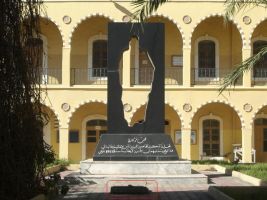
There have been many massacres at the hands of the Italians. In Italian schools, we are taught little about our colonial history, but in this country everyone remembers it well. There were even concentration camps and the killing of those and their families that tried to resist. This Islamic school used to be a police headquarters at the beginning of the occupation. In the centre of the yard, a tank were opposers were thrown and left to die a slow lingering death.
No one knows the figures and the identities of many of them. Some say many thousands. This monument in front of the trap door (circled in red) is a reminder.
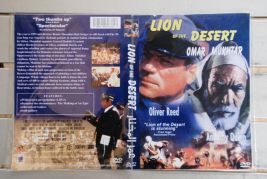
Italian Censors
A film was made that tells the story of the capture and assassination of Omar Mukhtar, a hero of the Libyan resistance against the Italians. It was filmed in 1979 and starred the notable actors: Oliver Reed and Anthony Quinn; It is titled “Lion of the Desert”.
It arrived in Italy in 1981 after it was presented at Cannes with discreet success but was then immediately withdrawn. Some other attempts for its general release have been made, like in Trento in 1987 where once again it was unfortunately prohibited by DIGOS (Italian law enforcement agency).
We think this is unacceptable!!
Today, maybe Italy has changed and the film may become available, maybe even in Italian. In any case, we went looking for it and traced an English version. Should anyone wish to see it, drop us a line.
Financed by Gaddafi, the film isn’t entirely faithful to historical fact, and there are many hints “in favour” of the modern regime, especially the participation and the actions of the groups of Libyan rebels that are caught up in the story.
If you wish to know more:
http://www.retididedalus.it/Archivi/2007/dicembre/METICCIA/leone.htm
Of course, now we are great friends with the Libyans! This is what you will find in the national museum. We nearly had a heart attack!
Gaddafi’s Canals
A great idea that has improved the quality of life for all Libyans no end.
Libya is just desert. Desert everywhere. These canals for the transportation of water from deep springs were realized from the profits made from the oil fields.
Consequently, agriculture has been a huge success and the country has become self-sufficient in agricultural and food produce.
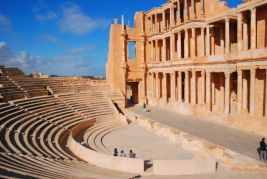
Site of Sabratha– 30 Jan 2009
A city that was founded around 200 B.C. by the Phoenicians. Conquered by the Romans and developed and inhabited for centuries until 5000, the end of the Roman Empire. Inhabited by the Byzantines and then destroyed by vandals. There remains a splendid theatre by the sea, many thermal baths, tank systems and interesting mosaics.
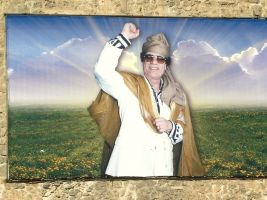
Our impressions
It is like being on a very short lead.
A few more days and I’m sure we'd have started barking! No…actually, yelping!
Our “guide” is actually an interface between state controller and tourist. He has kilos of photocopies that he distributes to every roadblock (every 100km), to every hotel, to every museum entrance, to every archaeological site. Any movement has to be communicated and authorization sort from the police that always want to know where we are. A small change of plan that could arouse the authority’s suspicion means a series of re-authorizations and annulments that drive our “guide” crazy.
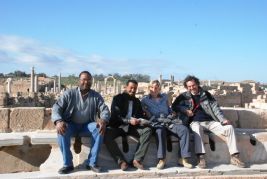
If you want a real guide, knowledgeable on the surrounding sites and the city, then you have to pay for one as generally, those that will accompany you know very little if anything. It is an advantage if you can speak English.
It is also very expensive; we paid 115-euro/pounds a day for a guide with the car. Plus 65-euro/pounds for the visa multiplied by five (even though there were only two of us).
We owe thanks to the very good Layla (who comes from Turin) and runs a travel agency, we were able to fill out all the paperwork before our arrival.
www.avventurianovi.com
She helped us take care of all the documents, number plates of Mahamoud Akka, the affable Libyan that accompanied us and who is experienced working with groups that are enthusiastic about the desert. www.desertakakus.com.
We recommend both of them.
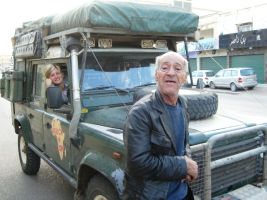
If you aren’t in a group and you don’t want to have a desert experience then DO NOT come to Libya. Apart from the two sites we mentioned, the coast hasn’t got that much to offer taking into account the prices and the problems that can arise.
It is curious to hear how the elderly speak perfect Italian, having been to the colonial schools built in the thirties. They stop us and we have lovely chats, they show us old photos, they even applaud us. They tell us their stories and recall events with tearful eyes.
Despite everything, we were really welcomed by the people. From the State, not so much
